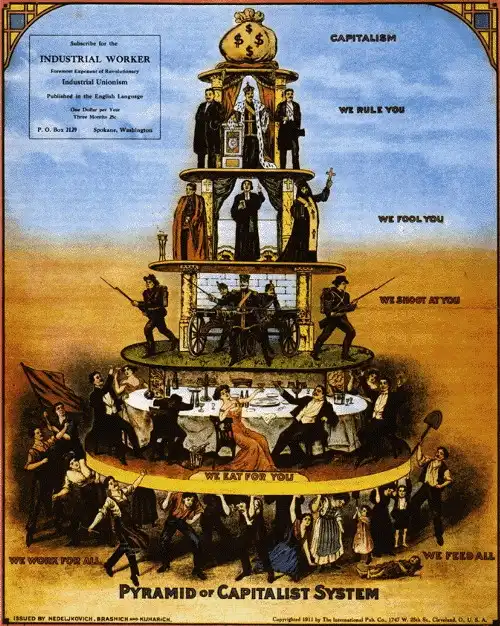The Great Misfortune of Society:
|
Novel by Stefan Stenudd |
This emerged when society swelled from small tribes where everybody knew each other, into big civilizations of thousands of individuals, most of them completely unknown to one another. Early examples are the cities of Memphis and Ur, with thousands of inhabitants already in the third millennium BC.
The increase and concentration of population was possible through agriculture, by which the work of some could feed plenty. Agriculture was introduced in the New Stone Age, around 10,000 years BC, and was significantly developed in the seventh and sixth millenniums BC.
Unfortunately, it also led to a drastic drop in human life expectancy, which was circa 33 years in the pre-agricultural Old Stone Age and dropped to 20 years in the New Stone Age. Not until the 20th century did the life expectancy rise significantly above the Old Stone Age value.
Another consequence of agriculture was the rise of hierarchies. Kings and aristocracies emerged and took control with the force of arms, making the rest of the population helpless subjects. They seized the surplus of agriculture and became the rulers of the world. That's pretty much still the situation.
A hierarchy doesn't in itself necessarily lead to greater injustice than the unequal distribution of power. But alas, we're yet to see a society where additional injustice is not the unavoidable outcome of that first one. Those who can will grab what they want, which tends to be more than they really ever need. And the ones who can't stop it are robbed of everything but what they need for basic survival. Sometimes even that is ripped away from them.
Why is that so? Many would hurry to say it's human nature. But that's jumping to conclusions. The study of non-agricultural society, those who live as hunters and gatherers, shows that they live by the code of general reciprocity they share everything, always, thereby making sure that no one's needs are ignored. It's almost a sacred thing in those societies, where deviation from it is regarded as repulsive.
Still, sometimes it happens that an individual makes sure to receive what others give, but escapes from returning the favor. Cultural anthropology calls this a freeloader someone who wants to share the benefits without sharing the sacrifice needed for them.
It may go unnoticed for a while, but when exposed, this person is finally thrown out of the community. Usually, those who are expelled like that return humbled and reformed, after discovering how tough life is in solitude, without the support of others. They learn the lesson.
But in agricultural society, where populations multiplied and small tribes were replaced by big communities of thousands of inhabitants, freeloaders were able to continue their ways in anonymity, and simply move from one part of the community to another when exposed. They could go on exploiting the trust of others, and did so until they had the resources to grab what they wanted by force, instead of asking for it.
They became the rulers. The growing society had no protection against freeloaders, so it was soon taken over by them. They're still in control.
Look at so many leaders of the world today. They use their positions primarily to spoil themselves, living luxuriously, increasing their fortunes beyond any reasonable limit, holding on to their power with any means they deem necessary, whatever the cost to society as a whole.
That is strikingly true about countless politicians, making their decisions on what they gain on the most, and business executives, cooperating to squeeze the companies for absurd salaries and bonuses. This minority in power treats the rest of mankind as little more than cattle.
They even claim that this is only human, as if it's what we all would do in the same situation. Not true. Only freeloaders think like that. They just want to defend their own misuse of power, in a hubris of not only taking all but getting praise for it as well.
In the rare occasions when others than freeloaders get power and money, they act quite differently. They try to do some good with it good for us all. But they're viciously opposed by the freeloaders, who usually succeed in keeping anyone but their own kind out of power to begin with.
I don't believe we can solve the dire injustices of society until we get rid of the freeloaders in positions of power. How to do that is no easy matter, but it has to begin by exposing them. Of all people in power and all people of wealth, we must demand benevolence and altruism. That's only what society with its laws and actions demands of everybody else.
Actually, I think the Internet may bring along a change also here, since it's a tremendous resource in exposing injustice wherever it resides. Traditional media tends to be reluctant about that, since they are both owned and led by the privileged few. But the Internet escapes such control and censorship, so there's a chance it will persist and thereby increase the pressure on our leaders to be fair. At length, that can make freeloaders shun leadership altogether.
March 12, 2013
More Speculations
About Cookies
My Other Websites
CREATION MYTHS
Myths in general and myths of creation in particular.
TAOISM
The wisdom of Taoism and the Tao Te Ching, its ancient source.
LIFE ENERGY
An encyclopedia of life energy concepts around the world.
QI ENERGY EXERCISES
Qi (also spelled chi or ki) explained, with exercises to increase it.
I CHING
The ancient Chinese system of divination and free online reading.
TAROT
Tarot card meanings in divination and a free online spread.
ASTROLOGY
The complete horoscope chart and how to read it.
MY AMAZON PAGE
MY YOUTUBE AIKIDO
MY YOUTUBE ART
MY FACEBOOK
MY INSTAGRAM
MY TWITTER
STENUDD PÅ SVENSKA

Stefan Stenudd
About me
I'm a Swedish author of fiction and non-fiction books in both English and Swedish. I'm also an artist, a historian of ideas, and a 7 dan Aikikai Shihan aikido instructor. Click the header to read my full bio.

 Sunday Brunch with the World Maker
Sunday Brunch with the World Maker